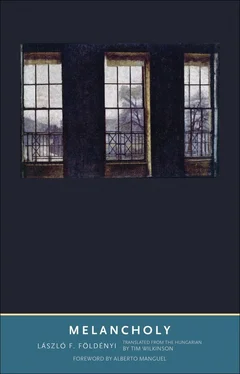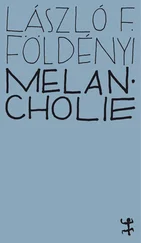Being is man’s fundamental experience, but at the thought of annihilation, even nothing can turn into an experience. And the more it does, the less capable he is of distinguishing the two experiences. For melancholics, fulfillment is connected with being dispossessed. They see themselves equally as the chosen ones, standing at the center of existence, and as outcasts, a point hovering in nothingness. For them, the preponderant experience of nothingness is nothing other than an experience of the fragmentariness of existence . Wherever they tread, they end up in the same situation. What they reach is not life but total paralysis: the eerie immobility of the subjects of the portraits signals that the recognition of nothingness has fateful consequences: nothingness starts to expand in the melancholics themselves. 15Richard III was a good deal more active than Hamlet, of course, but both of them realized that mockery was being made of them: the hope of becoming autonomous persons was dangled before them, and since they took it seriously, they had to die in the effort. They went to meet their destinies with the greatest helplessness, and nothing could alter that: once a person has gained a taste of knowledge, nothing will protect him any longer. At the beginning of the fifteenth century, in a work entitled Observations on Death and Judgment Day , Jacques Legrand wrote: “The more knowledge increases, the greater does the concern grow, and a person becomes more melancholic the truer and more perfect the knowledge he possesses about his own situation” 16(quoted in Klibansky, Panofsky, and Saxl, Saturn and Melancholy , 232). We are unable to be reconciled to our own fate — whether we close our eyes (becoming believers, blending in with the earthly world) or accept our fate, we will equally lose ourselves. We do not know who whispered the fateful injunction “Be yourself!” into the ears of Renaissance melancholics, but it could not have been either the heavens or earth because then the injunction would not have been addressed to a few but to everyone. Melancholics are chosen (or rather preferred) people whose existence proves that between the celestial and earthly worlds there is another world, which is shrouded in secrecy. This is the realm of nothingness. It is ultimately due to the insolubility of this riddle that God and earthly existence are mysterious. Melancholics of the Renaissance era were the first to point out that nothing is natural and self-evident: neither the existence of God nor earthly, human existence. A melancholic may be seen as a huge question mark preceded by the questions “Who am I?” and “Why am I?”
The growing concern about which Legrand complains is caused by knowledge; that knowledge, in turn, is not merely the accumulation of acquired knowledge but is identical with rumination itself. True knowledge is that which offers the hope of becoming autonomous, but since that hope gives rise to disappointment, hope and the deprivation of hope are simultaneously present in knowledge. In that way, knowledge is a wonderment at existence; it does not conceal in itself an accumulated body of knowledge, but is constantly revealing itself: in possession of true knowledge, one feels one’s way into the unknown, opens up to obscurity, and lets it stream in. True knowledge is not just being aware that I do not — and cannot — know anything, but is also a way of life: the acceptance of a precarious position even at the cost of destruction. True knowledge is not granted to those who simply collect the body of knowledge regarded as given and unalterable, but to those who, by smuggling sense into the world, try to create a new world by their own efforts. A scholar does not collect but radiates; his position is similar to that of the sun: he is the middle of the universe. Those, however, who try seriously to make use of knowledge become forlorn of hope; true knowledge does not create a world but drives one to despair, adds trouble to trouble. True scholars have to realize that if they believe their position to be like that of the sun, then that sun will hide behind clouds and eventually turn black. The way that melancholics of the Renaissance interpreted life was determined by this duality. The subjects of the portraits stand at once in and outside space; the murderous despots are caught in the yoke of time, but they are entranced by timelessness. What could be more typical of their situation than that modern melancholia spread at the same time that experimentation with perspective did. The universe of Uccello is truly just as a lonely person sees it; it is inconceivable that the perspectival world would be any other than eyes lingering at the vanishing point of lines perceive it. The world is not the work of God but of man musing as he looks around, of the individual armed with knowledge; if one makes a step to the right or the left, not only will one see the world differently, but it also really will be different. The structure of perspectival paintings necessarily gives the impression of being “natural”; the creator is not God, however, but a mortal who came into the world by chance. “A spatial object must lie in infinite space,” says Ludwig Wittgenstein, adding in parentheses: “A point in space is an argument place” ( Tractatus logico-philosophicus , 2.0131). The perennial problem of point of view derives from the fact that a central perspective is not “objective” (in the sense that God would be an objective creator compared with an earthly artist), but a random way of looking at things. The main limitation here is precisely that it is never possible to see and perceive the infinite multiplicity of things at one and the same time — a person cannot look from outside at what he is inside; thus one cannot be in command of totality. What we do have command over is one solid point (our own self), and we feel capable of re-creating the world. One’s situation becomes unstable; there is nothing to hang onto in the surrounding nothingness. If the world is the way I see it, then what is the world like? As painting in perspective evolved, the standards of collective experience started to disappear. Everything becomes open to question — including the exclusivity of the perspectival way of looking at things. That is what melancholics of the time started to realize. Since no perspectival relationship is conceivable between the indeterminate position of the melancholic subjects of the portraits and the landscape behind their backs, those paintings of the time that best convey melancholia also make the contradiction inherent in the perspectival view of their objects. These paintings question the solidity of the universe. 17The fate of Dürer is widely known: he sought to determine perfect beauty geometrically, but had to admit that the attempt was unsuccessful. In 1508 he declared, “What beauty is I know not,” and “No single man can be taken as a model of a perfect figure, for there is not a man alive on earth who is endowed with the whole of beauty. . There is also no man alive upon earth who could give a final judgment upon what the perfect figure of a man is; God alone knows that” (Dürer, The Painter’s Manual ). Twenty years later: “Without the certainty of knowledge who would be able to tell us that [that is, how to make a beautiful human form]? I do not believe there is any man alive who could say about the tiniest living creature, let alone a human, what is the greatest beauty in it. . The lie is in our understanding, and darkness is so firmly entrenched in our mind that even our groping will fail” (Dürer, De Symmetria partium in rectis formis humanorum corporum , trans. Silvio Levy). Dürer’s Melencolia I , his etching on the theme of melancholy and all its appurtenances, which became the most popular representation of the condition not just in the Renaissance era but generally, is well known. Yet melancholy is first and foremost the theme of the picture; the perspective, the formal principle, is not governed by the customary Düreresque skepticism. The picture tackles the theme of melancholy but is not itself melancholic; the structure, the composition, the approach, all demonstrate that in this case Dürer, who was prone to melancholia, did not relate melancholically to his theme but viewed it (like a true theme) as an outside observer — one with insider knowledge, we may add. Dürer’s picture attests to such a self-confident way of looking at things that, despite presenting many of the distinguishing marks of melancholia, at one point it comes to a sudden stop. It was probably the technical limits of the etching genre that forced him to halt, since his paintings display a much deeper familiarity with melancholia. One has to look elsewhere for an appropriate pictorial mode of representation of melancholia. Dürer treated melancholia as an object, but we know at least one painting in which melancholia is simultaneously subject and form, in which melancholia, the melancholic state, is both represented and — on account of doubts regarding the perspectival, self-confident way of looking at things — descriptive of the very mode of representation. That is Jan van Eyck’s Portrait of Giovanni Arnolfini and His Wife , or The Arnolfini Wedding .
Читать дальше












